-

新人教版高中英语选修2Unit 4 Journey Across a Vast Land教学设计
当孩子们由父母陪同时,他们才被允许进入这个运动场。3.过去分词(短语)作状语时的几种特殊情况(1)过去分词(短语)在句中作时间、条件、原因、让步状语时,相当于对应的时间、条件、原因及让步状语从句。Seen from the top of the mountain (=When it is seen from the top of the mountain), the whole town looks more beautiful.从山顶上看,整个城市看起来更美了。Given ten more minutes (=If we are given ten more minutes), we will finish the work perfectly.如果多给十分钟,我们会完美地完成这项工作。Greatly touched by his words (=Because she was greatly touched by his words), she was full of tears.由于被他的话深深地感动,她满眼泪花。Warned of the storm (=Though they were warned of the storm), the farmers were still working on the farm.尽管被警告了风暴的到来,但农民们仍在农场干活。(2)过去分词(短语)在句中作伴随、方式等状语时,可改为句子的并列谓语或改为并列分句。The teacher came into the room, followed by two students (=and was followed by two students).后面跟着两个学生,老师走进了房间。He spent the whole afternoon, accompanied by his mom(=and was accompanied by his mom).他由母亲陪着度过了一整个下午。

新人教版高中英语选修2Unit 1 Science and Scientists-Learning about Language教学设计
Step 7: complete the discourse according to the grammar rules.Cholera used to be one of the most 1.__________ (fear) diseases in the world. In the early 19th century, _2_________ an outbreak of cholera hit Europe, millions of people died. But neither its cause, 3__________ its cure was understood. A British doctor, John Snow, wanted to solve the problem and he knew that cholera would not be controlled _4_________ its cause was found. In general, there were two contradictory theories 5 __________ explained how cholera spread. The first suggested that bad air caused the disease. The second was that cholera was caused by an _6_________(infect) from germs in food or water. John Snow thought that the second theory was correct but he needed proof. So when another outbreak of cholera hit London in 1854, he began to investigate. Later, with all the evidence he _7_________ (gather), John Snow was able to announce that the pump water carried cholera germs. Therefore, he had the handle of the pump _8_________ (remove) so that it couldn't be used. Through his intervention,the disease was stopped in its tracks. What is more, John Snow found that some companies sold water from the River Thames that __9__________________ (pollute) by raw waste. The people who drank this water were much more likely _10_________ (get) cholera than those who drank pure or boiled water. Through John Snow's efforts, the _11_________ (threaten) of cholera around the world saw a substantial increase. Keys: 1.feared 2.when 3. nor 4.unless 5.that/which 6.infection 7.had gathered 8.removed 9.was polluted 10.to get 11. threat

新人教版高中英语选修2Unit 1 Science and Scientists-Reading and thinking教学设计
Step 5: After learning the text, discuss with your peers about the following questions:1.John Snow believed Idea 2 was right. How did he finally prove it?2. Do you think John Snow would have solved this problem without the map?3. Cholera is a 19th century disease. What disease do you think is similar to cholera today?SARS and Covid-19 because they are both deadly and fatally infectious, have an unknown cause and need serious public health care to solve them urgently.keys:1. John Snow finally proved his idea because he found an outbreak that was clearly related to cholera, collected information and was able to tie cases outside the area to the polluted water.2. No. The map helped John Snow organize his ideas. He was able to identify those households that had had many deaths and check their water-drinking habits. He identified those houses that had had no deaths and surveyed their drinking habits. The evidence clearly pointed to the polluted water being the cause.3. SARS and Covid-19 because they are both deadly and fatally infectious, have an unknown cause and need serious public health care to solve them urgently.Step 6: Consolidate what you have learned by filling in the blanks:John Snow was a well-known _1___ in London in the _2__ century. He wanted to find the _3_____ of cholera in order to help people ___4_____ it. In 1854 when a cholera __5__ London, he began to gather information. He ___6__ on a map ___7___ all the dead people had lived and he found that many people who had ___8____ (drink) the dirty water from the __9____ died. So he decided that the polluted water ___10____ cholera. He suggested that the ___11__ of all water supplies should be _12______ and new methods of dealing with ____13___ water be found. Finally, “King Cholera” was __14_____.Keys: 1. doctor 2. 19th 3.cause 4.infected with 5.hit 6.marked 7.where 8.drunk 9.pump 10.carried 11.source 12.examined 13.polluted 14.defeatedHomework: Retell the text after class and preview its language points

新人教版高中英语选修2Unit 2 Bridging Cultures-Discovering useful structures教学设计
The grammar of this unit is designed to review noun clauses. Sentences that use nouns in a sentence are called noun clauses. Nominal clauses can act as subject, object, predicate, appositive and other components in compound sentences. According to the above-mentioned different grammatical functions, nominal clauses are divided into subject clause, object clause, predicate clause and appositive clause. In this unit, we will review the three kinds of nominal clauses. Appositive clauses are not required to be mastered in the optional compulsory stage, so they are not involved.1. Guide the students to judge the compound sentences and determine the composition of the clauses in the sentence.2. Instruct students to try to learn grammar by generalizing grammar rules, controlling written practice, and semi-open oral output.3. Inspire the students to systematize the function and usage of noun clause1.Instruct students to try to learn grammar by generalizing grammar rules, controlling written practice, and semi-open oral output.2.Inspire the students to systematize the function and usage of noun clauseStep1: The teacher ask studetns to find out more nominal clauses from the reading passage and udnerline the nominal clauses.

新人教版高中英语选修2Unit 3 Food and Culture-Discovering useful structures教学设计
The newspaper reported more than 100 people had been killed in the thunderstorm.报纸报道说有一百多人在暴风雨中丧生。(2)before、when、by the time、until、after、once等引导的时间状语从句的谓语是一般过去时,以及by、before后面接过去的时间时,主句动作发生在从句的动作或过去的时间之前且表示被动时,要用过去完成时的被动语态。By the time my brother was 10, he had been sent to Italy.我弟弟10岁前就已经被送到意大利了。Tons of rice had been produced by the end of last month. 到上月底已生产了好几吨大米。(3) It was the first/second/last ... time that ...句中that引导的定语从句中,主语与谓语构成被动关系时,要用过去完成时的被动语态。It was the first time that I had seen the night fact to face in one and a half years. 这是我一年半以来第一次亲眼目睹夜晚的景色。(4)在虚拟语气中,条件句表示与过去事实相反,且主语与谓语构成被动关系时,要用过去完成时的被动语态。If I had been instructed by him earlier, I would have finished the task.如果我早一点得到他的指示,我早就完成这项任务了。If I had hurried, I wouldn't have missed the train.如果我快点的话,我就不会误了火车。If you had been at the party, you would have met him. 如果你去了晚会,你就会见到他的。

新人教版高中英语选修2Unit 3 Food and Culture-Reading and thinking教学设计
The discourse explores the link between food and culture from a foreign’s perspective and it records some authentic Chinese food and illustrates the cultural meaning, gerography features and historic tradition that the food reflects. It is aimed to lead students to understand and think about the connection between food and culture. While teaching, the teacher should instruct students to find out the writing order and the writer’s experieces and feelings towards Chinese food and culture.1.Guide the students to read the text, sort out the information and dig out the topic.2.Understand the cultural connotation, regional characteristics and historical tradition of Chinese cuisine3.Understand and explore the relationship between food and people's personality4.Guide the students to use the cohesive words in the text5.Lead students to accurately grasp the real meaning of the information and improve the overall understanding ability by understanding the implied meaning behind the text.1. Enable the Ss to understand the structure and the writing style of the passage well.2. Lead the Ss to understand and think further about the connection between food and geography and local character traits.Step1: Prediction before reading. Before you read, look at the title, and the picture. What do you think this article is about?keys:It is about various culture and cuisine about a place or some countries.

新人教版高中英语选修2Unit 5 First Aid-Discovering useful structures教学设计
You have no excuse for not going.你没有理由不去。He was punished for not having finished his homework.他因未完成作业而受到惩罚。2.动词ing形式复合结构由物主代词或人称代词宾格、名词所有格或普通格加动词ing,即“sb./sb.'s+doing”构成。动词ing形式的复合结构实际上是给动词ing形式加了一个逻辑主语。动词ing形式的复合结构有四种形式:①形容词性物主代词+动词ing②名词所有格+动词ing③代词宾格+动词ing④名词+动词ingHer coming to help encouraged all of us.她来帮忙鼓舞了我们所有人。The baby was made awake by the door suddenly shutting.这个婴儿被突然的关门声吵醒了。Can you imagine him/Jack cooking at home?你能想象他/杰克在家做饭的样子吗?无生命名词无论是作主语还是作宾语都不能用第②种形式。Tom's winning first prize last year impressed me a lot.汤姆去年得了一等奖使我印象深刻。Do you mind my/me/Jack's/Jack leaving now?你介意我/杰克现在离开吗?Excuse me for my not coming on time.很抱歉我没能按时来。His father's being ill made him worried.他父亲病了,他很担心。We are looking forward to the singer's/the singer to give us a concert.我们盼望着这位歌手来给我们举办一场演唱会。

新人教版高中英语必修3Unit 1 Festivals and Celebrations-Listening &Speaking&Talking教学设计
The theme of this section is “Talk about festival activities and festival experiences”.Festival and holiday is a relaxing and interesting topic for students. This part talks about the topic from the daily life of students’. In the part A ---Listening and Speaking, there are three conversations among different speakers from three countries(Japan, Rio and China), where the speakers are participating in or going to participate in the festivals and celebrations. So listening for the relationship among them is a fundamental task. Actually, with the globalization and more international communication, it is normal for Chinese or foreigners to witness different festivals and celebrations in or out of China. In the Conversation 1, a foreign reporter is interviewing a Japanese young girl who just had participated in the ceremony of the Coming-of-Age Day on the street and asking her feeling about the ceremony and the afterwards activities. Conversation 2, Chinese girl Li Mei is witnessing the Rio Carnival for the first time, and her friend Carla gives her some advice on the costumes which enables her to match with the carnival to have a good time. Conversation 3, a Chinese guide is showing a group of foreign visitors around the Lantern Festival and introducing the customs of the festival to them. The three conversations have a strong vitality and insert the festival and cultural elements from different countries. So perceiving the festivals and cultures from different countries is the second task. At the same time, the scripts also insert the targeted grammar --- v-ing as attributive and predicative, which students can perceive and experience in a real context and make a road for the further study. That is the third task. In the Part B--- Listening and Talking, the theme is “Talk about festival experience”, which is the common topic in our daily conversations. During the conversation, Song Lin, a Chinese student, asked Canadian friend Max about how to spend Christmas. In the conversation, Song Lin talked about experience and the feelings during the Chinese Spring Festival, during which there are not only some enjoyable things but some unpleasant things. After the listening, perhaps students find there are some similarities between Christmas and the Chinese Spring Festival as there are some differences in the origins and celebrations. For example, people always visit friends and relatives, decorate their houses, have a big dinner together, chat and give presents to each other.

新人教版高中英语必修3Unit 2 Morals and Virtues-Discovering Useful Structure教学设计
1. 表示时间。Hearing these stories, I’m skeptical about the place. = When I heard these stories. . . 2. 表示原因。Not knowing his address, I can’t send this book to him. = Because/Since/As I don’t know his address. . . 3. 表示结果。His father died, leaving him a lot of money. =. . . and left him a lot of money4. 表示条件。Going straight down the road, you will find the department store. = If you go straight down the road. . . 5. 表示让步。Being tired, they went on working. =Although they were tired. . . 6. 表示行为方式、伴随情况或补充说明。He lay on the grass, staring at the sky for a long time. =. . . and stared at the sky for a long time注意:非谓语动词作状语时, 如所提供的动词不能和句子中的主语保持一致, 动词-ing形式必须有自己的逻辑主语, 通常由名词或代词来担任, 这就是独立主格结构。The last bus having gone, we had to walk home. (having gone的逻辑主语是the last bus, 而不是we)Weather permitting, the football match will be played on Friday. (permitting的逻辑主语是time, 而不是the football match)Step 7 Practice1. ________(study) hard, you are sure to get first prize. 2. People use plastic in their daily life, _______(leave) large amounts of waste. 3. ________(work) hard at your lessons, you are to succeed. 4. The old man, ____________(work) abroad for twenty years, is on the way back to his motherland. 5. ______________(finish) his homework, he was playing on the playground. Answers: 1. Studying 2. leaving 3. Working 4.having worked 5. Having finishedStep 8 HomeworkFinish the homework on Page 22.

新人教版高中英语选修2Unit 1 Science and Scientists-Using langauge教学设计
This happens because the dish soap molecules have a strong negative charge, and the milk molecules have a strong positive charge. Like magnets, these molecules are attracted to each other, and so they appear to move around on the plate, taking the food coloring with them, making it look like the colors are quickly moving to escape from the soap.Listening text:? Judy: Oh, I'm so sorry that you were ill and couldn't come with us on our field trip. How are you feeling now? Better?? Bill: Much better, thanks. But how was it?? Judy: Wonderful! I especially liked an area of the museum called Light Games.it was really cool. They had a hall of mirrors where I could see myself reflected thousands of times!? Bill: A hall of mirrors can be a lot of fun. What else did they have?? Judy: Well, they had an experiment where we looked at a blue screen for a while, and then suddenly we could see tiny bright lights moving around on it. You'll never guess what those bright lights were!? Bill: Come on, tell me!? Judy: They were our own blood cells. For some reason, our eyes play tricks on us when we look at a blue screen, and we can see our own blood cells moving around like little lights! But there was another thing I liked better. I stood in front of a white light, and it cast different shadows of me in every color of the rainbow!? Bill: Oh, I wish I had been there. Tell me more!? Judy: Well, they had another area for sound. They had a giant piano keyboard that you could use your feet to play. But then, instead of playing the sounds of a piano, it played the voices of classical singers! Then they had a giant dish, and when you spoke into it, it reflected the sound back and made it louder. You could use it to speak in a whisper to someone 17 meters away.? Bill: It all sounds so cool. I wish I could have gone with you? Judy: I know, but we can go together this weekend. I'd love to go there again!? Bill: That sounds like a great idea!
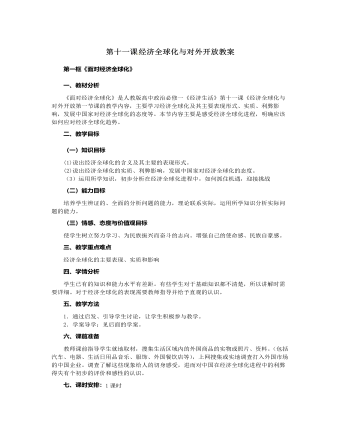
人教版高中政治必修1第十一课 经济全球化与对外开放教案
材料说明了什么?探究二:材料分析:2005年12月13日至18日,WTO第六次部长级会议在香港召开。会议经过谈判通过了《部长宣言》,规定发达成员和部分发展中成员2008年前向最不发达国家所有产品提供免关税、免配额的市场准入;发达成员2006年取消棉花的出口补贴, 2013年年底前取消所有形式农产品出口补贴。材料体现了世界贸易组织在国际经济贸易领域中发挥哪些作用?探究三:P97:A、这些图示,反映出我国利用外资哪些特点?。B、能为我国提高外资利用水平提出些建议吗?探究四:材料展示:我国是人口众多的发展中大国,全国居民每天消费总额达到37亿元。每天消费粮食75万吨,相当于一个县级商品粮基地的全年产量;每天消耗猪肉6万吨,食油1万吨,糖1.6万吨,鲜蛋1.8万吨。每天购买杂志600多万册,报纸5000多万份,需要400量中型载货汽车才能装载。
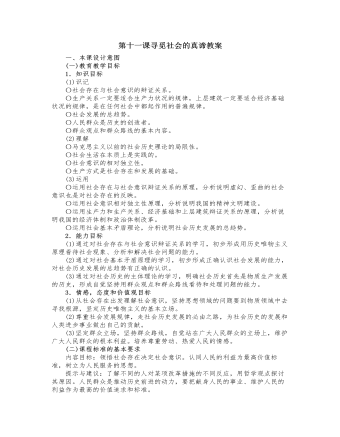
人教版高中政治必修4第十一课寻觅社会的真谛教案
思考提示在阶级社会中,社会基本矛盾的解决主要是通过阶级斗争实现的,阶级斗争是推动阶级社会发展的直接动力,当旧的生产关系严重阻碍生产力发展,需要进行变革时,代表旧的生产关系的没落阶级却不会自动退出历史舞台,利用旧的上层建筑维护自己的统治,只有代表新生产力发展方向的阶级通过社会革命,推翻没落的阶级统治,才能解放生产力,推动社会向前发展。所以,阶级社会的进步往往是通过激烈的社会革命实现的。但是,社会主义社会与阶级社会不同,这是因为,社会主义社会中,生产力和生产关系、经济基础和上层建筑之间的矛盾是一种非对抗性矛盾,不需要通过一个阶级推翻另一个阶级的阶级斗争的方式来解决,只能通过改革实现社会的发展,通过对生产关系和上层建筑进行改革,实现社会主义的自我完善,从而促进社会的发展。所以,我国经济体制改革是在坚持社会主义制度的前提下,改革生产关系和上层建筑中不适应生产力发展的一系列相互联系的环节和方面。
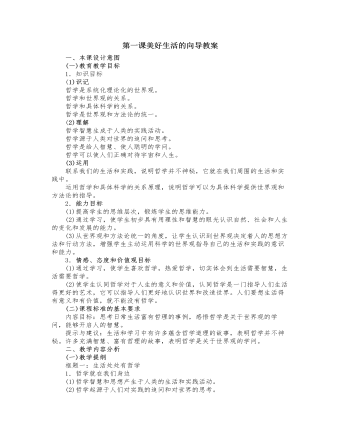
人教版高中政治必修4第一课美好生活的向导教案
3.柏拉图(公元前427一前347)古希腊哲学家。生于雅典。苏格拉底的弟子,亚里士多德的老师。他曾在雅典创办学园,收徒讲学,逐步建立起欧洲哲学史上第一个客观唯心主义体系。他也是欧洲哲学史上第一个有大量著作传世的哲学家。他提出世界的本源是“理念”,现实中的事物都是“理念”的摹本。人的知识来源于对“理念”的回忆。柏拉图的哲学思想对后世影响很大,有人说,柏拉图之后的欧洲哲学思想都是对柏拉图思想的注脚。4.黑格尔(1770—1t53l)19世纪德国古典哲学家,客观唯心主义者、辩证法大师。生于斯图加特,卒于柏林。出身于官僚家庭。曾在图宾根神学院学习哲学和神学。大学毕业后,做过几年家庭教师。后任报纸编辑、中学校长、大学讲师、教授和柏林大学校长。黑格尔是在法国革命的直接影响下成长起来的,青年时朝气蓬勃,非常激进。他还深受著名诗人歌德的影响。1818年,他到柏林大学任教后,公开美化普鲁士专制制度,号召人们同现实妥协。
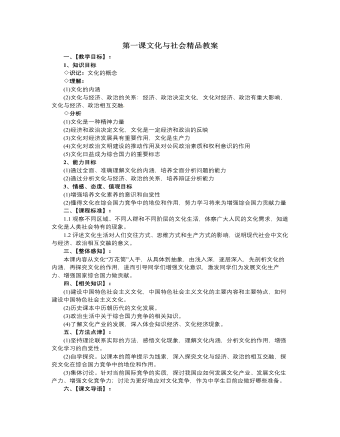
人教版高中政治必修3第一课文化与社会精品教案
(2)历史课本中历朝历代的文化发展。(3)政治生活中关于综合国力竞争的相关知识。(4)了解文化产业的发展,深入体会知识经济、文化经济现象。五、【方法点津】:(1)坚持理论联系实际的方法,感悟文化现象,理解文化内涵,分析文化的作用,增强文化学习的自觉性。(2)自学探究。以课本的简单提示为线索,深入探究文化与经济、政治的相互交融,探究文化在综合国力竞争中的地位和作用。(3)集体讨论。针对当前国际竞争的实质,探讨我国应如何发展文化产业、发展文化生产力、增强文化竞争力;讨沦为更好地应对文化竞争,作为中学生目前应做好哪些准备。六、【课文导语】:文化,一个我们十分熟悉的词汇。然而“熟知并非真知”。有人说,文化是知识;有人说,文化是艺术。究竟什么是“文化”?只要在社会生活中细细体味,我们就能真切地感悟“文化”的内涵与文化的力量。
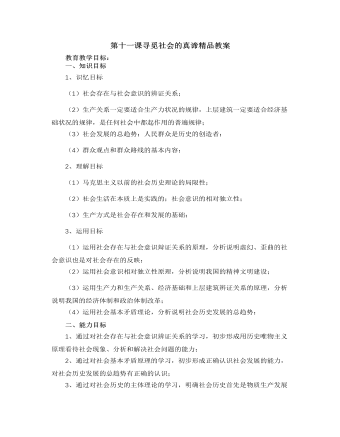
人教版高中政治必修4第十一课寻觅社会的真谛精品教案
A生产方式是人类社会存在和发展的基础人要生存必须有吃、穿、住、用等物质生活资料,只有生存问题解决了才能谈得上社会的存在和发展,才能从事其他的活动(教育、艺术、体育、政治)。而要获得物质生活资料,必须从事物质资料的生产劳动。在这一活动中,形成了现实的生产力和生产关系,即生产方式。【思想教育】落后必然挨打,我国大力发展经济,就是为了发展生产力。发展是硬道理,中国解决一切问题的关键在与自己的发展。要积极支持改革开放,积极投身于经济建设中去。现在学好知识将来教育育人,为社会培养更多的合格人才。B生产方式决定着社会的性质和面貌社会生活纷繁复杂,包括经济生活、政治生活、精神生活、婚姻家庭生活等许多方面。这些方面都受生产方式的制约,有什么样的生产方式,就有什么样的社会结构;不同的生产方式,表现为不同性质的社会形态。社会的整个面貌只能从生产方式中得到科学的说明。【举例】家庭联产承包责任制的产生与推广1958年的人民公社化运用曾使中国农民在劳动和分配上都实行绝对的平均主义,大锅饭的结果是饭越吃越少,人越过越穷。
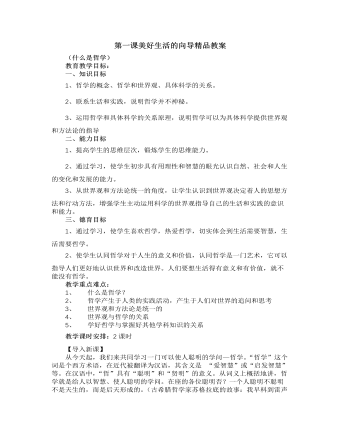
人教版高中政治必修4第一课美好生活的向导精品教案
b哲学为具体科学提供世界观和方法论的指导每一个时代的具体科学的发展,总是受到这个时代哲学思想的影响和支配。任何一个科学家都有自己的哲学信仰,都用一定的哲学世界观来指导自己的研究。缺乏正确的世界观和方法论的指导,就会在研究中失去正确方向,甚至陷入混乱和失败。【举例】牛顿晚年误入歧途牛顿早年在自发的唯物主义世界观的指导下,发现了万有引力定律,谱写了人类物理史上的辉煌篇章。他谦虚地说,他是站在巨人们的肩膀上,拾取了知识大海里一个晶莹美丽的贝壳。但在他的后半生,居然虔诚地投入上帝地怀抱,用25年的时间研究神学,写了100多万字有关神学和宗教的书稿。牛顿是一个虔诚的宗教信徒,自幼受到信奉上帝的教育,这对他的世界观影响极深,加之他所处的时代是形而上学统治自然科学的时代,在错误的世界观的支配下,他将解释不了的现象求助于上帝,如“从上帝那里去寻找行星围绕太阳公转的第一推动力”,结果一事无成。

教学反思数学仿编应用题活动《小鬼当家》课件教案
目的:1、让幼儿学会仿编和解答4的加减应用题。2、在生活情景中能根据水果卡片自编4的加减应用题。准备:1、知识经验准备:请家长带 幼儿去买东西,使幼儿了解一个买与卖的过程。2、物质准备:准备各种水果卡片,人手4个替代物作钱。过程:一、以“帮农民伯伯摘果子”引入。“小朋友,果园里的水果都成熟了,农民伯伯想请你们帮他摘水果,你们愿意吗?”(愿意)二、游戏“摘水果”。师交代游戏玩法和规则。三、分类活动:分水果。1、引导幼儿将自己所摘的水果跟同伴之间进行交流。2、交代任务:将各种水果分别放在筐里。
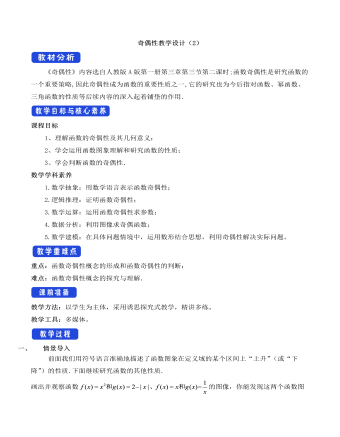
人教A版高中数学必修一奇偶性教学设计(2)
《奇偶性》内容选自人教版A版第一册第三章第三节第二课时;函数奇偶性是研究函数的一个重要策略,因此奇偶性成为函数的重要性质之一,它的研究也为今后指对函数、幂函数、三角函数的性质等后续内容的深入起着铺垫的作用.课程目标1、理解函数的奇偶性及其几何意义;2、学会运用函数图象理解和研究函数的性质;3、学会判断函数的奇偶性.数学学科素养1.数学抽象:用数学语言表示函数奇偶性;2.逻辑推理:证明函数奇偶性;3.数学运算:运用函数奇偶性求参数;4.数据分析:利用图像求奇偶函数;5.数学建模:在具体问题情境中,运用数形结合思想,利用奇偶性解决实际问题。重点:函数奇偶性概念的形成和函数奇偶性的判断;难点:函数奇偶性概念的探究与理解.教学方法:以学生为主体,采用诱思探究式教学,精讲多练。

人教A版高中数学必修一诱导公式教学设计(1)
一、复习回顾,温故知新1. 任意角三角函数的定义【答案】设角 它的终边与单位圆交于点 。那么(1) (2) 2.诱导公式一 ,其中, 。终边相同的角的同一三角函数值相等二、探索新知思考1:(1).终边相同的角的同一三角函数值有什么关系?【答案】相等(2).角 -α与α的终边 有何位置关系?【答案】终边关于x轴对称(3).角 与α的终边 有何位置关系?【答案】终边关于y轴对称(4).角 与α的终边 有何位置关系?【答案】终边关于原点对称思考2: 已知任意角α的终边与单位圆相交于点P(x, y),请同学们思考回答点P关于原点、x轴、y轴对称的三个点的坐标是什么?【答案】点P(x, y)关于原点对称点P1(-x, -y)点P(x, y)关于x轴对称点P2(x, -y) 点P(x, y)关于y轴对称点P3(-x, y)

人教A版高中数学必修一基本不等式教学设计(2)
《基本不等式》在人教A版高中数学第一册第二章第2节,本节课的内容是基本不等式的形式以及推导和证明过程。本章一直在研究不等式的相关问题,对于本节课的知识点有了很好的铺垫作用。同时本节课的内容也是之后基本不等式应用的必要基础。课程目标1.掌握基本不等式的形式以及推导过程,会用基本不等式解决简单问题。2.经历基本不等式的推导与证明过程,提升逻辑推理能力。3.在猜想论证的过程中,体会数学的严谨性。数学学科素养1.数学抽象:基本不等式的形式以及推导过程;2.逻辑推理:基本不等式的证明;3.数学运算:利用基本不等式求最值;4.数据分析:利用基本不等式解决实际问题;5.数学建模:利用函数的思想和基本不等式解决实际问题,提升学生的逻辑推理能力。重点:基本不等式的形成以及推导过程和利用基本不等式求最值;难点:基本不等式的推导以及证明过程.

